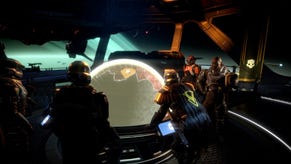The Long-form Emotion
Since November, I've been playing one of two games all day, every day.
I've not been at my computer the whole time, but I've been playing. I've been thinking about how best to out-think my opponents. How to manoeuvre my troops into a position that provides me the best opportunity to attack. I'm not usually one to enjoy strategy games, but when I'm given the time to let it occupy one of my lesser brain functions for a while, somehow it all clicks. For the past four months, strategy has controlled my mind.
The two games in question are Solium Infernum, and Neptune's Pride. The first is a play by email diplomatic strategy game set in hell that can take anywhere up to two months to get through a game. Some days will be good, and you'll get more than one turn done, but most will just give you one development. But it works, because that gives you a good twenty-three hours and fifty minutes spent thinking about what you're going to do, rather than the ten minutes it actually takes to do it.
Neptune's Pride is a different beast entirely. You take control of a galactic empire, starting off with a single star system, through slowly building up ships and taking over the surrounding systems, until eventually fighting wars with your neighbours all in a bid to get control. Ships take thirty minutes to prep their engines for hyper-space, and quite often take about half a day to get from one star to the next. These games take, at the very least, a few weeks to complete. And that's a few weeks of checking in on your empire every spare minute you've got, adjusting flight paths and second-guessing your enemies. Sending off messages into the aether attempting to form mutually beneficial alliances that you can break at the opportune moment.
It makes me appreciate chess masters. They take an incredibly short amount of time to evaluate the board and come up with plans, counter-plans and contingency plans, all figuring out every possible move that their opponent can play. They're thinking dozens of moves ahead, while they play the one right in front of them. I'm spending an entire day deliberating over one choice, and I can hardly think more than a few turns ahead. Their brains must be massive.
All this comes at a price, though. When you're playing a normal game, it might last ten minutes, or at most an hour or two. In that time you're experiencing the highs and lows of the play, from the satisfaction of pulling off a headshot or the glory of amassing a large force to take out your opponent in a strategy games. These emotions last for minutes at the most, purely transitory, to a degree where by the time you play the next game they're all but forgotten about. When your game lasts weeks and months, the entire opposite happens.
It's like watching a car crash in slow motion. You get to see every single detail of the sudden violence in front of you, and there's little you can do to stop it. Except when there is, and you get to feel like a god slowing down time, allowing you to react faster than you have any right to. It's gaming as the master of time, manipulating things to benefit yourself. Except you're not the only timelord on the pitch, and everyone else gets the same advantage that you do. Every single emotion you feel is amplified to an unbearable degree. Each victory is that much sweeter, every defeat infinitely more crushing. You form plots like some sort of deranged Machiavelli, engineering circumstances until your enemies are locked in a chessmate, just open for you to manipulate and black mail.
But these games don't exist purely in the glacier-like speed that they play out on. Sure, you might watch a fleet of starships slowly crawl along the map, but you can easily communicate with the other players, be it inside the game or outside, and form and break alliances in the split second. It serves to confuse and split your mind, creating an illusion of control and power that you don't really have. You can talk someone around as much as you like, but they can hardly take back that fleet they send at your homeworld the other hour. It's inevitability mixed with hope, each combating the other.
It does mean, however, that all the worst tropes of the strategy game become that much more amplified as a result. Neptune's Pride is perhaps more guilty than Solium Infernum, but, as with most strategy games, by the half-way point of any game it's usually pretty clear who's won, and far more clear who's lost. Try as you might, if you're not with the front of the pack by that point, it's going to take a miracle to get you back. And that realisation is that much worse when you have to accept that this is going to take days, if not a week or so, to finish up. That's a week of losing, and trying not to accept it as reality.
It's easy to slip into pretension and compare the level of emotion felt at these games is close to what historical generals must have felt when they get to the point of having to accept defeat. Their pain isn't going to be over quickly either, and that crushing pressure of having to endure loss after loss makes you yearn for a 'quit' button more than in any other gaming experience I can think of. The urge to give into anarchy and blow your load on one last attack, attempting to cause as much damage as you can before going out is almost overwhelming. But in many ways, that'd be worse.
You might get one last victory out of it, but it would be beyond hollow. You'd have to sacrifice all personal defence to pull it off, and even if you did cause any damage it could be quickly healed. I guess I'm focusing too much on specific flaws in this kind of game, but instead of hairline fractures, they're becoming yawning chasms of frustration and annoyance when the game you're playing lasts so very, very long.
Mostly though, it's the exhaustion that really hits. That whole 'spending every waking moment thing' isn't a hyperbole. It's pure fact; this is the default that your brain slips back to, to the degree where sleeping is a mistake, and having a meal away from your computer is a risky endeavour. People start to track your habits, watching when you're away from the computer, because that's the best time to launch their attack. This is far more true of Neptune's Pride, but it's similarly present in Solium Infernum; time not spent formulating plans is time lost. And, for the most part, game lost.
There's an element of this that seems almost educational. You start to get introspective, looking at yourself, and why you're playing, at what you're playing for. Do you really want to win, or do you just want to have one last ditch attempt at feeling like you've got some element of control over the game? It's the reason I became a Blood Vassal for Quinns; it was part asylum seeking, part securing myself a place that wasn't last. It's also how people stay alive in Neptune's Pride; make yourself too troublesome to eradicate, and suddenly you become a potential ally. And potential allies tend to survive a little longer.
I suppose the most powerful emotion in all of this is relief. It's waking up the day after the whole thing has ended, and not having to fire up your computer that second to check what damage your unconsciousness has caused. Suddenly you're free, and it's glorious. It almost makes it all completely worth it.









